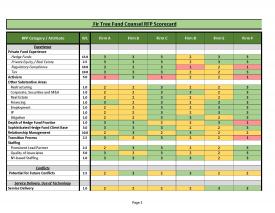At the beginning of 2018, Fir Tree Partners’ small legal team launched an effort to streamline its legal operations by using many of the same processes and technology solutions adopted by large corporate law departments. Using the ACC Legal Operations Maturity Model as a roadmap, the team targeted legacy pain-points and designed a bespoke legal operations function that has brought results in cost savings, increased efficiency, budget predictability, and improved outcomes.
The case for change was clear, says Brian Meyer, General Counsel at Fir Tree since 2005. The department’s handful of attorneys was serving dozens of internal clients on more than 200 matters and managing 20 to 25 law firm relationships. “Resource management was very manual, and the billing process was a huge administrative nightmare,” he says. By task-tracking for a sample two-week period, Meyer found that his staff was spending up to 60 percent of their time on manual, administrative matters.
Working with Deputy General Counsel John Ringwood and with assistance from HBR Consulting, Fir Tree focused on three priorities: vendor management, contract management, and knowledge management.
For vendor management, Meyer brought HBR Consulting’s CounselCommand product on board, configured to Fir Tree’s key performance indicators, and began tracking law firm performance and cost.
Going forward, Fir Tree implemented a data-driven process for selecting the best legal resource for each matter. For high-impact matters, they designed an RFP process that uses a formulaic scorecard to assign weighted scores to over a dozen factors including substantive experience, depth of practice, fees, relationship management, and diversity.
“We had a high-level sense of overall quality but using 12 criteria gave us granular insights,” Meyer says. “It became clear that we needed to revisit some relationships.” The narrowed panel now numbers six firms.
They implemented Legal Tracker for e-billing, which feeds raw data into the CounselCommand dashboard. This end-to-end solution for intake, review, and processing of invoices significantly reduced the time burden. The data inspired Fir Tree to make changes to its billing guidelines, as the team began to track KPIs on staffing and diversity.
For low-risk and low-complexity matters, the department uses alternative legal service providers. “We were able to unlock use of ALSPs when we became a more data-driven Legal department,” says Ringwood. The team’s first stop was finding a solution for high-volume NDA reviews.
“The work was previously outsourced to a top global law firm, but the feedback from our investment team was that it was sluggish and expensive process. Investment professionals want 24-hour turnaround on their NDAs ,” says Ringwood. “The ALSP that we selected pairs a custom technology solution with experienced lawyers, offers rapid turnaround, and delivers at a fraction of the previous cost. It represents a monumental shift in a repeatable business process that now runs better than ever.”
As a result, the legal team is delivering superior outcomes, while reducing external spend by 20 percent.
On contract lifecycle management (CLM), there was not enough volume to justify a costly enterprise solution, but Meyer wanted its elements and functionality, so the team customized and developed their own CLM solution.
“We built it from the ground-up by connecting pipes between existing platforms that were already in-use by the enterprise,” Ringwood says.
For standard corporate contracts, internal clients submit requests through an internal legal hub which are then routed to an ALSP who processes them using standard playbooks and clause libraries. Once finalized, contracts are e-signed and their metadata is fed into CounselCommand for lifecycle tracking, an innovative configuration linking the two systems requested by Fir Tree. The solution drastically reduces administrative time required to locate key documents and provides actionable business intelligence and metrics. Contract review cycle times have been cut in half.
“The key learning is that CLM tools are great and anybody can buy them, but they are not always appropriate or economical for small law departments,” says Meyer.
The third major initiative was the creation of a knowledge management process-- an internal intuitive intranet for the curation, search, and sharing of knowledge assets. “We looked at our focus areas, and only captured the information that we regularly used,” Meyer says. “It’s important to keep it alive, so we made it easy to drop information in.”
Despite its small size, the legal department has improved productivity by about 60 percent. They utilize a connected ecosystem of 12 tech-enabled legal operations systems, monitor 65 KPIs on their dashboards, and have saved the company more than a million dollars already.
“We’ve proven that small law departments can embraces a sophisticated legal operations function on a relatively limited budget without a dedicated legal operations team,” says Meyer.



